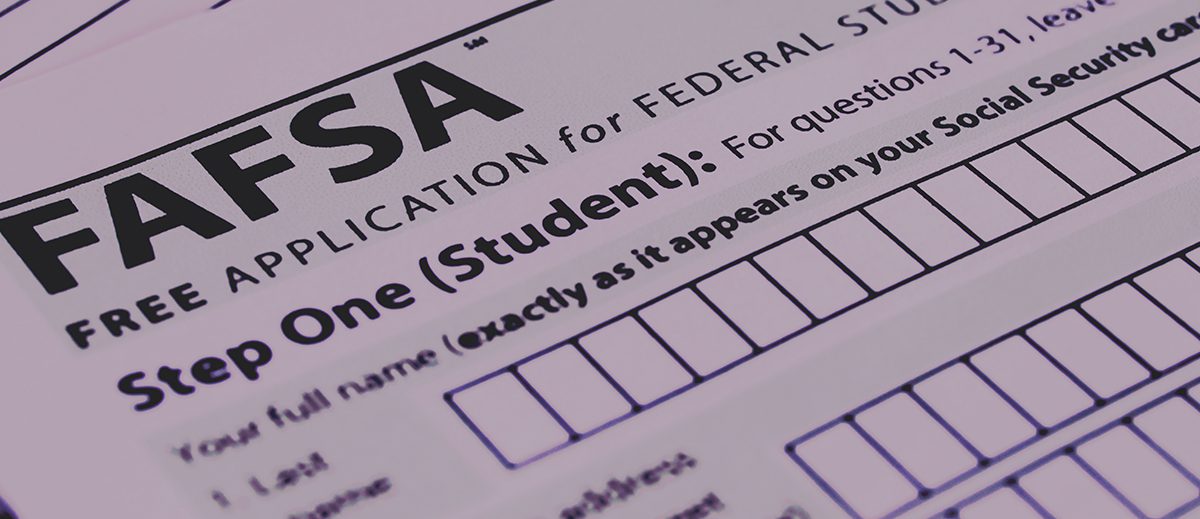FAFSA Fast Facts
As you prepare for next steps toward college plans, get clarity and peace of mind with these fast facts about FAFSA from GEAR UP:
What is FAFSA?
FAFSA stands for Free Application for Federal Student Aid, and it is a mandatory application for federal student aid that is also used by universities to determine available financial aid for students.
How important is FAFSA?
FAFSA is one of the most important applications that students (who are currently in or have just finished their senior year of high school) should complete when deciding to pursue higher education. FAFSA helps determine financial need from the U.S. Department of Education – no matter how little or how great. You’ll never know how much you’ll receive until you apply. More students than ever before are eligible for federal grant funding!
Who fills out the FAFSA?
The FAFSA process is a shared experience for students and parents. Be sure to have social security numbers ready, as well as an active personal email address (such as gmail or yahoo) that can be accessed for years to come.
How do I start the FAFSA?
To start the FAFSA, an FSA ID is required. Students and parents must have an FSA ID to fill out the form, including parents without a Social Security number. If you don’t have a social security number, rest assured there are additional alternatives available. Starting this year, students and parents may no longer create an FSA ID and complete the form at one time. Applicants will be required to wait up to 5 days for their information to be verified. We encourage students and parents to complete this step as soon as possible to be prepared once the FAFSA opens.
What should I know for the 2024-2025 FAFSA?
This year, significant changes to the FAFSA have caused Federal Student Aid (FSA) to delay its opening. The 2024-25 FAFSA will open on December 31, 2023. In the following years, the FAFSA will return to its usual October 1 opening date.
Starting this year, you can include up to 20 colleges or institutions and edit or change your selections if needed. Include all of the colleges you are considering applying to on the FAFSA so the information is available to once you complete your college application.
While federal grants, funds and loans do not run out, Oklahoma students who complete their application early may be eligible for additional grant funding from institutions that could run out.
I’ve heard the FAFSA is changing – what changed?
- Parents will no longer need to have their income tax documents handy because tax information will now be generated automatically once the FSA ID is created.
- For dependent students with separated parents, the parent providing the most financial support must be included on the new FAFSA. For many students, this will align with the previous requirement of including the custodial parent – the parent living with the student.
- The Expected Family Contribution (EFC) has been replaced with the Student Aid Index (SAI), which increases the number of students eligible for grant funding but does not account for siblings in college and requires the full net worth of businesses and farms to be reported in assets.
- Terminology has changed
- The IRS Data Retrieval Tool (DRT) is now called the Direct Data Exchange (DDX), which all applicants must consent to for federal financial aid eligibility
- The Student Aid Report is now called the FAFSA Submission Summary
- Parents/Guardians/Providers are now called ‘Contributors’
Learn more about the new terminology here.
I submitted the FAFSA. Now what?
Once your FAFSA has been submitted, students will receive a Student Aid Index (SAI). College financial aid offices, state agencies, and the federal government will use the SAI to determine eligibility for financial aid and the student will receive communication directly from their institution of choice on their financial aid availability.
Wherever you are in the process of preparing for college, GEAR UP is here to be your partner every step of the way. Our staff members are a phone call away and are always here to help answer parent and student questions.
For a full overview of FAFSA in 10 minutes or less check out Episode 6 of Higher Ed Hacks on Spotify or Apple Music!
Reach out today!
High school students – Email your School Specialist
College students – Email your College Coach
Parents – Email your Education Coordinator

